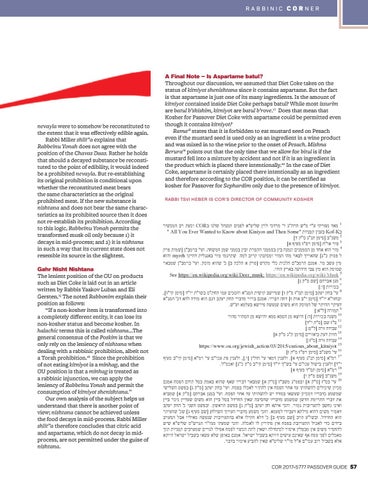RABBINIC CORNER
A Final Note – Is Aspartame batul?
nevayla were to somehow be reconstituted to the extent that it was effectively edible again. Rabbi Miller shlit”a explains that Rabbeinu Yonah does not agree with the position of the Chavas Daas. Rather he holds that should a decayed substance be reconstituted to the point of edibility, it would indeed be a prohibited nevayla. But re-establishing its original prohibition is conditional upon whether the reconstituted meat bears the same characteristics as the original prohibited meat. If the new substance is nishtana and does not bear the same characteristics as its prohibited source then it does not re-establish its prohibition. According to this logic, Rabbeinu Yonah permits the transformed musk oil only because 1) it decays in mid-process; and 2) it is nishtana in such a way that its current state does not resemble its source in the slightest.
Throughout our discussion, we assumed that Diet Coke takes on the status of kitniyot shenishtana since it contains aspartame. But the fact is that aspartame is just one of its many ingredients. Is the amount of kitniyot contained inside Diet Coke perhaps batul? While most issurim are batul b’shishim, kitniyot are batul b’rove.17 Does that mean that Kosher for Passover Diet Coke with aspartame could be permitted even though it contains kitniyot? Rama18 states that it is forbidden to eat mustard seed on Pesach even if the mustard seed is used only as an ingredient in a wine product and was mixed in to the wine prior to the onset of Pesach. Mishna Berura19 points out that the only time that we allow for bitul is if the mustard fell into a mixture by accident and not if it is an ingredient in the product which is placed there intentionally.20 In the case of Diet Coke, aspartame is certainly placed there intentionally as an ingredient and therefore according to the COR position, it can be certified as kosher for Passover for Sephardim only due to the presence of kitniyot. RABBI TSVI HEBER IS COR’S DIRECTOR OF COMMUNITY KOSHER
Gahr Nisht Nishtana
The lenient position of the OU on products such as Diet Coke is laid out in an article written by Rabbis Yaakov Luban and Eli Gersten.15 The noted Rabbonim explain their position as follows: “If a non-kosher item is transformed into a completely different entity, it can lose its non-kosher status and become kosher. In halachic terms this is called nishtana…The general consensus of the Poskim is that we only rely on the leniency of nishtana when dealing with a rabbinic prohibition, albeit not a Torah prohibition.16 Since the prohibition of not eating kitniyot is a minhag, and the OU position is that a minhag is treated as a rabbinic injunction, we can apply the leniency of Rabbeinu Yonah and permit the consumption of kitniyot shenishtana.” Our own analysis of the subject helps us understand that there is another point of view; nishtana cannot be achieved unless the food decays in mid-process. Rabbi Miller shlit”a therefore concludes that citric acid and aspartame, which do not decay in midprocess, are not permitted under the guise of nishtana. COR 2017-5777 PASSOVER GUIDE 57
